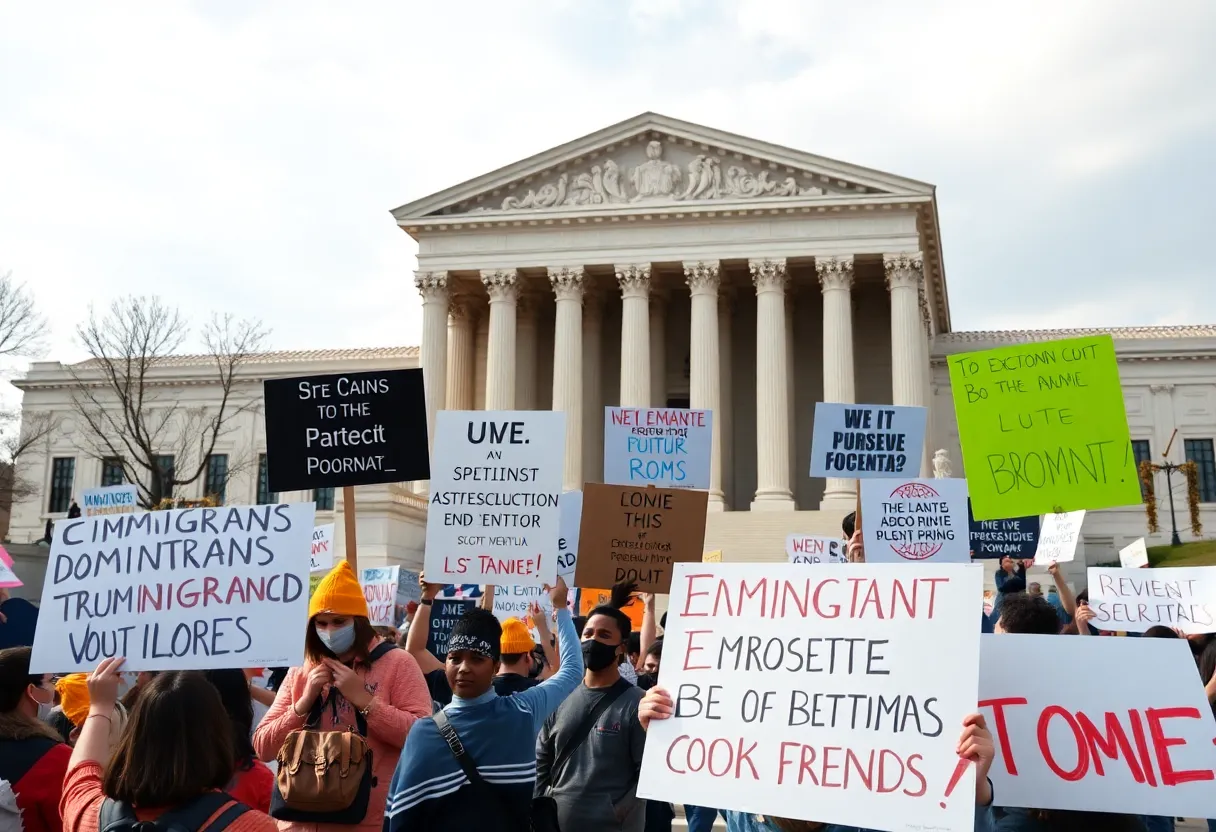News Summary
The Supreme Court is examining the implications of President Trump’s executive order to end birthright citizenship, which has faced hurdles in lower courts. Justices are deliberating on whether lower courts can block such directives and the constitutional validity of the order under the 14th Amendment. Discussions are raising concerns about the potential chaos from inconsistent enforcement of laws. Public protests accompany these deliberations, reflecting the contentious nature of immigration rights in America. The decision could redefine executive power and citizenship rights significantly.
The Supreme Court Deliberates Trump’s Birthright Citizenship Executive Order
The Supreme Court is digging into one of the most controversial topics surrounding immigration and citizenship in the country – President Donald Trump’s executive order to end birthright citizenship. This order has faced significant hurdles in lower courts, and now the justices are examining its implications and the limits of judicial authority.
Blocked Order Under Scrutiny
Earlier court rulings have put a hold on this executive order, preventing the Trump administration from moving forward with the policy. During the latest arguments, the justices appeared to be leaning towards lifting the nationwide injunction that currently stands in the way, stirring quite the discussion about the principles and ramifications of such an action.
Complex Questions Raised
As the justices deliberate, they are grappling with some tough questions. First, they need to consider whether lower courts have the power to block presidential directives on a global scale. Secondly, they have to evaluate the merits of the birthright citizenship order itself, particularly in light of the 14th Amendment, which has traditionally granted citizenship to all individuals born on U.S. soil.
The Case for Limiting Lower Court Powers
A significant part of the conversation focused on whether to restrict the ability of lower court judges to issue nationwide injunctions. Advocates for limiting this power, including Solicitor General John Sauer, argue that lower courts are expanding their reach and hindering the administration’s ability to execute its policy agenda efficiently.
Rulings and Established Precedents
The discussion took an interesting turn as several justices pointed out that the administration has consistently lost in lower courts concerning the constitutionality of this birthright citizenship issue. There is considerable concern that allowing the administration to act on this order could potentially conflict with long-established Supreme Court precedents.
Concerns Over Consistency
Justice Ketanji Brown Jackson raised alarms about the possibility of creating a chaotic legal landscape if nationwide injunctions were discarded. She warned that this could lead to a “catch me if you can” scenario, sparking inconsistent enforcement of laws across multiple jurisdictions. Fellow justices echoed these sentiments, highlighting concerns over how varying citizenship statuses might emerge across different states.
Suggestions for Judicial Alternatives
Amid these discussions, some justices floated the idea that class-action lawsuits could serve as an alternative for challengers seeking relief from executive orders, albeit acknowledging that this route could be both time-consuming and resource-intensive.
A Potential Shift in Executive Power
The outcome of this Supreme Court case could have enormous implications for President Trump’s ability to wield executive orders in the future without the green light from Congress. With many justices showing an interest in addressing the constitutional basis of the birthright citizenship order directly, the decision could redefine the relationship between the judiciary and executive branches.
The Public’s Response
What Lies Ahead?
While the justices did not reach a consensus during their discussions, their comments indicated a potential alignment on the necessity of revisiting the scope of nationwide injunctions. The timeline for a final decision remains uncertain, but it is possible that the resolution could extend until the end of the current court term.Whatever the ruling, it promises to shape the future of executive authority and citizenship rights in profound ways.
Deeper Dive: News & Info About This Topic
- BBC News: Supreme Court Deliberates Birthright Citizenship
- Wikipedia: Birthright Citizenship in the United States
- New York Times: Supreme Court and Birthright Citizenship
- Google Search: Supreme Court Birthright Citizenship
- The Guardian: Updates on Supreme Court and Birthright Citizenship
- Encyclopedia Britannica: Birthright Citizenship

Author: STAFF HERE FLORENCE WRITER
The FLORENCE STAFF WRITER represents the experienced team at HEREFlorence.com, your go-to source for actionable local news and information in Florence, Florence County, and beyond. Specializing in "news you can use," we cover essential topics like product reviews for personal and business needs, local business directories, politics, real estate trends, neighborhood insights, and state news affecting the area—with deep expertise drawn from years of dedicated reporting and strong community input, including local press releases and business updates. We deliver top reporting on high-value events such as the Florence Festival of Lights, Pee Dee Pride, and agricultural expos at the Florence Center. Our coverage extends to key organizations like the Florence Regional Chamber of Commerce and the Pee Dee Area Council of Governments, plus leading businesses in healthcare and retail that power the local economy such as McLeod Health and Pee Dee Electric Cooperative. As part of the broader HERE network, including HERECharleston.com, HEREColumbia.com, HEREGreenville.com, and HEREHiltonHead.com, we provide comprehensive, credible insights into South Carolina's dynamic landscape.





